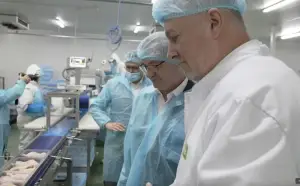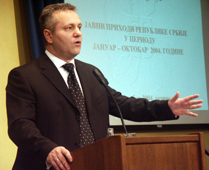- Serbia
Get to know Serbia
- Citizens
Culture and science
Health services
Pension and disability insurance
- Business
Employment
Economy
- Media
- Government
- Contact
Keep in touch
Contact form
Back
Keepin touch
Whether you have a question, comment, suggestion or any problem in the purview of the government, send us your message and we will try to respond as soon as possible. If your problem is not in our purview, we will forward your message to the relevant institution.
Q:
A:
Finance Ministry to amend legislation to ease tax burden on citizens, economy
Belgrade,
10 November 2004
Serbian Minister of Finance Mladjan Dinkic has announced changes and amendments to several tax-related laws in a bid to encourage economic growth and boost employment.
The government has cut budget spending, creating conditions for a substantial reduction in tax burden on the economy and citizens in 2005, Dinkic told a press conference today. The Ministry has proposed changes and amendments to several tax laws, which the parliament's economy committee approved yesterday, said Dinkic, noting that the government is due to debate the proposed legislation at a session tomorrow.
As of January 1, all companies opening new jobs will be granted a one-year exemption from the 14 percent income tax under changes and amendments to the income tax law, said Dinkic. The measure, which aims to create more jobs in the economy, will reduce corporate taxes and contributions from 77 percent earlier this year to 52 percent, he explained.
A new law on contributions will scrap taxes and social contributions for companies employing people over 50 years of age, the Minister added.
Businesses subject to the 14 percent profit tax will be allowed a four percent cut so they can be competitive with hypermarkets, Dinkic also noted.
According to Dinkic, the proposed legislation also calls for abolishing agricultural revenue tax, as well as excise tax on diesel fuel for tractors, construction machinery and ships. It also stipulates a 30 percent cut in fuel prices for farmers.
Changes and amendments also concern the abolishment of all taxes burdening trade in stocks and securities to help develop the capital market and reduce interest rates.
As of January 2005, banks will be exempt from financial transaction, service and turnover taxes, in a move that will save some 10 billion dinars in the banking sector and cut interest rates.
The Minister further announced stricter fines for property tax evasion, which he said will be two to twenty times higher than the tax amount.
As part of the press conference, Dinkic presented the first issue of the Serbian public finance bulletin, designed to inform the public on Serbia's public revenue and spending every month.
According to him, Serbia's budget deficit in the first ten months of the year fell by 10 billion dinars, year-on-year, to 21 billion dinars.
In October alone, the deficit stood at 1.7 billion dinars, a level planned for the same month next year as well.
Budget revenue in January-October climbed 20 percent year-on-year, he went on to say, noting that a 22.3 percent rise in sales tax revenue came as a result of the introduction of fiscal cash registers.
As of January 1, all companies opening new jobs will be granted a one-year exemption from the 14 percent income tax under changes and amendments to the income tax law, said Dinkic. The measure, which aims to create more jobs in the economy, will reduce corporate taxes and contributions from 77 percent earlier this year to 52 percent, he explained.
A new law on contributions will scrap taxes and social contributions for companies employing people over 50 years of age, the Minister added.
Businesses subject to the 14 percent profit tax will be allowed a four percent cut so they can be competitive with hypermarkets, Dinkic also noted.
According to Dinkic, the proposed legislation also calls for abolishing agricultural revenue tax, as well as excise tax on diesel fuel for tractors, construction machinery and ships. It also stipulates a 30 percent cut in fuel prices for farmers.
Changes and amendments also concern the abolishment of all taxes burdening trade in stocks and securities to help develop the capital market and reduce interest rates.
As of January 2005, banks will be exempt from financial transaction, service and turnover taxes, in a move that will save some 10 billion dinars in the banking sector and cut interest rates.
The Minister further announced stricter fines for property tax evasion, which he said will be two to twenty times higher than the tax amount.
As part of the press conference, Dinkic presented the first issue of the Serbian public finance bulletin, designed to inform the public on Serbia's public revenue and spending every month.
According to him, Serbia's budget deficit in the first ten months of the year fell by 10 billion dinars, year-on-year, to 21 billion dinars.
In October alone, the deficit stood at 1.7 billion dinars, a level planned for the same month next year as well.
Budget revenue in January-October climbed 20 percent year-on-year, he went on to say, noting that a 22.3 percent rise in sales tax revenue came as a result of the introduction of fiscal cash registers.
-
 Belgrade, 22 November 2025
Belgrade, 22 November 2025"Wine Vision by Open Balkan” international fair opened
-
 Belgrade, 27 October 2025
Belgrade, 27 October 2025Construction of Selova dam of vital importance for southeast Serbia
-
 Belgrade, 22 October 2025
Belgrade, 22 October 2025First 19 resolutions awarded under IPARD III for procurement of new tractors
-
 Šid, 21 October 2025
Šid, 21 October 2025Superior Foods example of successful Serbia-Hungary cooperation
-
 Belgrade/Washington, 17 October 2025
Belgrade/Washington, 17 October 2025Confirmation of Serbia’s position as attractive investment destination
-
 Belgrade/Washington, 16 October 2025
Belgrade/Washington, 16 October 2025Serbian economy maintains stability amid global challenges
-
 Sombor, 14 October 2025
Sombor, 14 October 2025Agriculture one of major pillars of bilateral cooperation with Italy
-
 Belgrade, 13 October 2025
Belgrade, 13 October 2025First IPARD III resolutions on support to farmers presented
-
 Belgrade, 21 September 2025
Belgrade, 21 September 2025Solution for legalisation of 4.8 million properties by year’s end
-
 Belgrade, 19 September 2025
Belgrade, 19 September 2025Strong potential for Italian investments in Serbia’s processing sector


